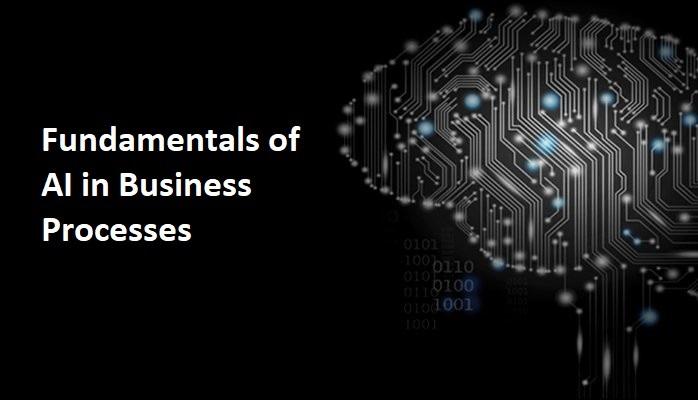Fundamentals of AI in Business Processes

In today's dynamic business environment, organizations are tasked with achieving a balance between efficiency, innovation, and customer satisfaction. AI development services are reshaping operations, using machine learning, data analysis, and automation to generate insights from data and streamline workflows. With AI, companies can enhance operations, improve customer experiences, anticipate trends, and enable informed decisions, increasing agility and adaptability.
AI is revolutionizing company operations by implementing better, data-driven procedures. Businesses employ AI to achieve a competitive advantage by optimizing activities with machine learning and data analytics, automating interactions with natural language processing, and improving cybersecurity. Integration with IoT devices boosts productivity, while predictive analytics tailors marketing strategies for success in the digital era.
What is Artificial Intelligence (AI) In Business?
Business artificial intelligence employs technology such as computer vision, machine learning, natural language processing, and data analytics to improve decision-making, automate processes, and increase production. It allows you to evaluate massive volumes of data, identify trends, and get valuable insights for improving company operations and consumer experiences.
Chatbots, predictive analytics, RPA, and recommendation systems all improve productivity, reduce costs, and allow businesses to respond swiftly to market changes. AI optimizes customer service, supply chains, marketing, finance, and human resources, promoting cost savings, innovation, growth, and competitive advantage.
Fundamentals of AI in Business Processes
1. Data as the Backbone of AI
AI relies heavily on data, the foundation for machine learning algorithms. Businesses require accurate data from a variety of sources, including consumer interactions and financial records. Raw data must be processed and prepared to ensure accuracy and reduce bias. Data privacy is critical for enforcing rules and protecting consumer information..
2. Machine Learning and Deep Learning for Process Automation
Machine learning uses both supervised and unsupervised learning to automate processes, including fraud detection, predictive maintenance, and consumer segmentation. Deep learning uses neural networks to solve complicated problems like image recognition and natural language processing. Continuous training is necessary for accurate AI applications.
3. Automation of Routine Tasks with Robotic Process Automation (RPA)
RPA uses AI to automate repetitive tasks like data entry and compliance tracking, freeing employees for more strategic work. It reduces human errors, integrates with existing systems, and enhances data accuracy.
4. Natural Language Processing (NLP) for Customer and Employee Interactions
NLP enables AI systems to comprehend human language, automate operations such as customer service, and assess sentiment for feedback interpretation in fields such as customer support, product development, marketing, and HR decision-making.
5. Predictive Analytics for Strategic Decision-Making
Predictive analytics assists with forecasting and demand planning by evaluating historical data, risk management and fraud detection by recognizing trends that indicate fraud, and personalized marketing by studying consumer behavior to provide focused suggestions.
6. Integration of AI with the Internet of Things (IoT) for Enhanced Operations
IoT devices collect data for AI analysis, while IoT development services assist in optimizing operations. Sensors in manufacturing, for example, collect information for predictive maintenance. AI-IoT integration monitors real-time inventory levels and adjusts stock levels to increase supply chain efficiency. Artificial intelligence is utilized in smart buildings to increase energy efficiency and safety.
7. AI-driven cybersecurity for Business Protection
AI-powered cybersecurity technologies identify risks, evaluate insider activity, and automate incident response. They provide early warnings, prevent data breaches, and mitigate damage while reacting to emerging threats in the cybersecurity ecosystem.
8. Enhancing Decision-Making through Data Insights
AI makes predictive analytics possible for trend forecasting, real-time analytics for quicker data-driven decision-making, and tailored marketing for client loyalty and happiness. These tools help businesses optimize strategies, adapt to changes, and drive sales.
9. Improving Customer Service with AI-powered tools
AI-powered chatbots offer 24-hour support, answering consumer queries, processing orders, and resolving difficulties rapidly. Personalized solutions and promotions improve customer satisfaction and retention while reducing support costs.
10. Streamlining Supply Chain and Inventory Management
AI algorithms optimize inventory levels, predict demand, reduce waste, and prevent stockouts and overstock. In the supply chain, AI tracks shipments, minimizes disruptions, selects optimal routes, increases efficiency, cuts costs, ensures timely deliveries, and enhances customer trust.
11. Supporting Innovation through Data-Driven Product Development
AI uses market data to find trends, aiding product development and meeting consumer needs. In sectors like pharmaceuticals and tech, R&D is accelerated by data analysis for faster innovation.
12. Enhancing Security and Compliance Efforts
By automating inspections and recording modifications, AI-powered cybersecurity solutions reduce risks and fines while monitoring network activity for threats, preventing breaches, adapting to new threats, and ensuring regulatory compliance.
13. Enabling Flexibility with Scalable Business Models
AI helps organizations to readily scale by learning and adapting, enabling development into new areas, greater client bases, and new goods, as well as data analysis to refine plans for long-term success.
Conclusion
As businesses face an increasingly complex and competitive world, incorporating artificial intelligence (AI) into processes is important to operational excellence and innovation. Natural language processing, predictive analytics, and robotic process automation are examples of technologies that revolutionize processes to enable real-time responsiveness and strategic agility. AI integration with IoT and cybersecurity improves operational capabilities and data protection while assuring regulatory compliance. Embracing AI development services enables firms to automate operations, enhance relationships, analyze data, and respond to market demands. Understanding and adopting AI basics is critical for success in the digital age, as it enables growth, customer happiness, and a competitive advantage.
Post Your Ad Here
Comments